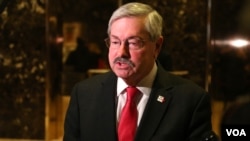U.S. President Donald Trump’s pick for ambassador to China, Terry Branstad, said he would help increase trade between the two countries, Chinese state media reported, amid concerns over protectionist talk from the new U.S. administration.
Trump has railed against China’s trade practices, blaming them for U.S. job losses, and has threatened to impose punitive tariffs on Chinese imports.
Beijing says it will work with Washington to resolve any trade disputes, but state media has warned of retaliation if Trump takes the first steps toward a trade war.
China 'potential'
Branstad, currently the governor of Iowa, said he would help to work out differences and that there was immense potential for more Chinese investment in the United States.
“We want to continue to enhance the relationship and to increase trade between our two countries,” Branstad told China’s official Xinhua news agency in an interview in the United States published late Thursday.
“I hope ... that I can play a constructive role trying to work out many of these differences in a way that makes it a win-win. It is beneficial to both of our countries, and also benefits the rest of the world,” Xinhua cited Branstad as saying.
“I think we have seen just the tip of the iceberg of the potential (Chinese) investments here,” he said.
Trump’s nomination of Branstad, a longtime Republican governor who has developed relationships with Chinese President Xi Jinping and other Chinese leaders, was well-received, even among some Democrats.
He still faces a confirmation hearing.
Critics of China's trade policies
Trump has moved to fill his administration with critics of China’s trade policies, including Wilbur Ross for Commerce Secretary, Robert Lighthizer for U.S. Trade Representative, and Peter Navarro, an economist and China hawk who will serve as a White House adviser.
Free trade advocates worry the Trump trade team will be too quick to use tariffs to keep imports out, raising costs for manufacturers that rely on imported parts, or even sparking retaliatory trade wars.
Xi made a vigorous defense of globalization at the World Economic Forum last month, and presented China’s economy as a “wide open,” despite complaints from the foreign business community that Beijing has not made good on pledges of economic liberalization.





